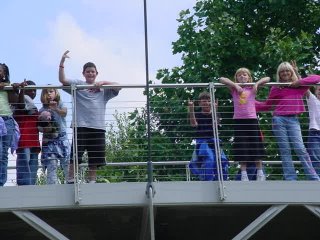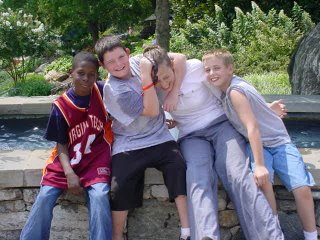
I think the most important “lesson” I learned is to see the positive spin everything has. In teaching this is most obvious in the area of correction. I watched good teachers do this many times at Sue Cleveland, reinforcing what I’d heard at the Marcia Tate* workshop and read in Mendler’s book. Instead of telling a child or a class “Be quiet and be still!” I now hear myself saying things like “wow! Y’all have a lot of energy! That is great! I need you to put that energy into listening to me for the next few minutes. I think you’ll like what I have to say.” It takes a little more time, maybe, but it reminds them (and me!) of their dignity as human beings, and encourages the positive aspects of their behavior or idea (their energy) rather than merely shooting down the negative aspects (their inattention). What’s that old saying? “You’ll catch more flies with honey than with vinegar.” Put another way, “it’s often more effective to affirm the right than to merely punish the wrong.” At the very least, I can avoid strictly negative, or accusing, words, even if I don’t have time to affirm the positive: “We use our feet for walking!” instead of “Don’t’ run!” I want kindness and mercy to be my default position: assuming the best, and ready to forgive the worst.
 Related to that commitment to positivity is the second resolution I have made: I am committed to enjoying what I do. The past 3 years, I have been plagued by a lack of confidence in my abilities as a musician, and this has hampered my own enjoyment of my art, and has made me quite fearful at the thought of teaching it. I was looking forward to Early Experience because I hoped it would be the key to me looking forward to teaching instead of dreading it. I learned that confidence and joy are, if not the same thing, then very closely related, so if I can have one, I can have the other. When I got up in front of a class, if I was determined to like them and to try and present the material in a fun way (no matter what their behavior was like), not only did I enjoy it, but they responded much better to me. Robin and I joked after particularly trying classes or days about how “the only person you can control in this classroom is yourself,” and that’s really true, but it’s empowering, not discouraging. I can determine to enjoy teaching and music quite apart from anyone else’s reaction to it (even my own—but that’s another topic. See 1 Cor. 4:1-4), and in that enjoyment, I also find confidence to teach it. I may not be the best singer or the best teacher, but I sure can try to have fun with what I have—and to get my students in on that joy.
Related to that commitment to positivity is the second resolution I have made: I am committed to enjoying what I do. The past 3 years, I have been plagued by a lack of confidence in my abilities as a musician, and this has hampered my own enjoyment of my art, and has made me quite fearful at the thought of teaching it. I was looking forward to Early Experience because I hoped it would be the key to me looking forward to teaching instead of dreading it. I learned that confidence and joy are, if not the same thing, then very closely related, so if I can have one, I can have the other. When I got up in front of a class, if I was determined to like them and to try and present the material in a fun way (no matter what their behavior was like), not only did I enjoy it, but they responded much better to me. Robin and I joked after particularly trying classes or days about how “the only person you can control in this classroom is yourself,” and that’s really true, but it’s empowering, not discouraging. I can determine to enjoy teaching and music quite apart from anyone else’s reaction to it (even my own—but that’s another topic. See 1 Cor. 4:1-4), and in that enjoyment, I also find confidence to teach it. I may not be the best singer or the best teacher, but I sure can try to have fun with what I have—and to get my students in on that joy.Lastly, I learned a good deal about teaching. I’ve been amazed at how much “little kids” can learn! Now I realize that that’s their “job,” after all—what they were made to do and do well at this point in their lives. How much, quickly, or well they learn, however, can be quite affected by how they’re taught. The best teaching comes through “stories.” Marcia Tate spoke of “narratives” and “chunking” (grouping materially logically into information clusters). A simple way to sum those techniques up would be to “find and tell the story in it,” be it in music theory, biology, history, or grammar. Stories make sense. They have beginnings, middles, and ends. A lot of times they have repetition. Anytime a lesson is logical, has important bits repeated, and has a rhythm to it, the chances of it sticking in a student’s brain are much higher. And stories are so much less boring than lectures! ☺ Another strategy, somewhat related, is how much children learn through games. My first week in Robin’s classroom, I was amazed at how much the children were learning and practicing through simple echo games: monkey see, monkey do. I think the reason these teaching strategies work well is that they capitalize on what children (and so all of us) naturally do: listen to stories and play games.
So...how has Early Experience left me richer? (Rich people make better teachers, because they have more to offer.) I'm taking at least three jewels with me: a view first for positives rather than for negatives... a determined commitment to enjoying what I will do...and (I hope) a teaching style that seeks to lead children as they most naturally would walk (story-telling, logic, and games). Maybe this'll even help me relate to you grown-ups better, too. ☺
*Dr. Marcia Tate is a teacher and noted speaker, and I got to attend one of her Teacher Workshops my first week as a Student Teacher!! Her best-known book is Workbooks Don't Grow Dendrites, and her catch-phrase is "the brain-compatible classroom" or "brain-compatible teaching." She's great!
2 comments:
hey... those are great things... especially for this teacher. I´ve been teaching a girl, Micaela, math, Spanish (as her first language and my second), logic, and Science. It´s been challenging for me. I think I´m just finally getting an idea of where she is in her understanding of things.
Then, I´m teaching Camila, 12 year old English student in School, and Claudio 32 year old boyfriend... English.... and together! Talk about a multilevel classroom... and just with two students! HA ;)
I found this website that has 99 different ways to say "good job"... I loved it and printed it off and have it on the front of my lesson plans... I´ll send it to you... in the spirit of trying to say positive without say "good job" all the time"
Just wait till you have a class all to yourself. It's great knowing you are souly responsible for these kids education. Talk about stress. : ) It was great talkin to you, you'll have to come up soon. Guess what, I updated my blog again, I guess I'm getting sucked into the blogger world, either that or i'm just really bored all alone on a Saturday.
Post a Comment